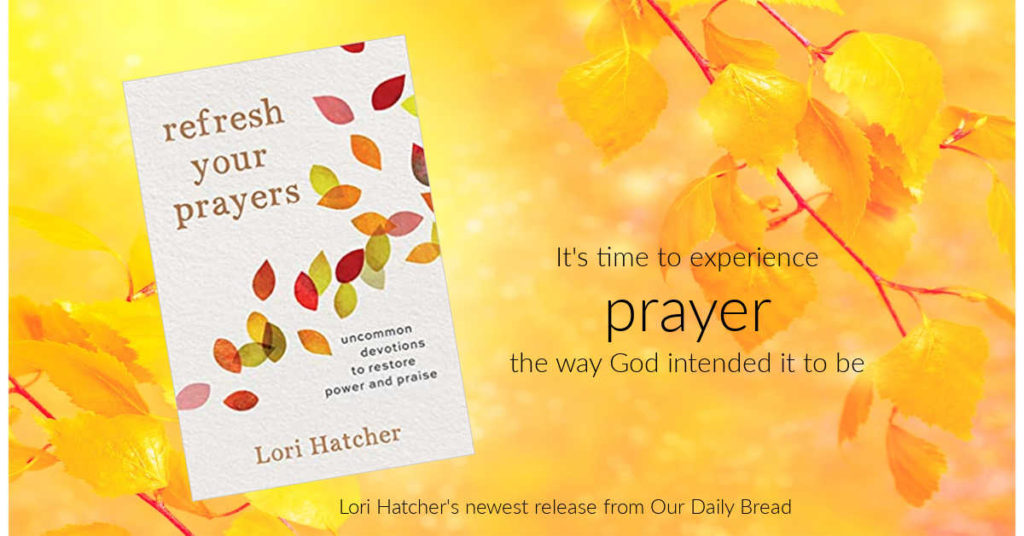God Hears Her is a podcast, inspired by the bestselling devotional by Our Daily Bread Publishing.
Hosts Elisa Morgan and Eryn Eddy are joined by a variety of guests to share personal stories of hope and encouragement. True freedom comes from sharing our journeys and knowing we’re not alone. This podcast is for women who are in the trenches of the beautiful and messy moments of relationships, work, ministry, and more.
Slow down. Be in the moment. Be known. Be heard.
This week I’m honored to join Elisa and Eryn to talk about prayer–what it is, what it isn’t, and what to do when God doesn’t answer as you’d hoped. I’d love for you to listen in. Here’s the link: Podcast — God Hears Her.
And here’s a devotion from my latest book, Refresh Your Prayers; Uncommon Devotions to Restore Power and Praise to continue the conversation.
Resting in God’s Sovereignty
“For my thoughts are not your thoughts, neither are your ways my ways,” declares the LORD. “As the heavens are higher than the earth, so are my ways higher than your ways and my thoughts than your thoughts.”
Isaiah 55:8-9
One morning I received a heartbreaking comment from a reader in response to one of my blog posts on prayer.
“Can’t bring back all the dead friends/family members I prayed for God to save,” she wrote. “Praying to preserve the few family I had left didn’t work either (down to one). Praying for healing from a health issue that has gone on for TWO YEARS and made my life miserable. Praying for this, praying for that, my heart gets hard when I get down on my knees. Just feels stupid. I can’t make myself believe.”4
As I bowed my head in prayer, I didn’t pray for her only. I prayed for all the weary warriors wondering if their prayers were accomplishing anything and whether God really cares.
And if He does, why would He answer our petitions with what appears to be the exact opposite of what we prayed for? Is it because our faith isn’t strong enough? Maybe prayer doesn’t work. Or perhaps God isn’t good.
The prophet Habakkuk didn’t comment on blog posts, but he wasn’t afraid to ask God questions. His example helps us puzzle through the mysteries of “bad” answers to “good” prayers.
“How long, LORD, must I call for help, but you do not listen?” he wrote. “Or cry out to you, ‘Violence!’ but you do not save? Why do you make me look at injustice? Why do you tolerate wrongdoing? Destruction and violence are before me; there is strife, and conflict abounds.”
Habakkuk1:2-3
Habakkuk was a godly, tenderhearted man grieving for his country. Everywhere he turned he saw violence, perversion, and a wanton disdain for God and His ways. His countrymen had turned their backs on all that was good and right, and danced merrily along a path leading straight to destruction. In vain he warned the people of Judah, pleading for them to forsake evil and turn back to God. He begged God to soften their hearts and draw them back to himself. He prayed for God’s mercy to lead His people to repentance.
God responded to Habakkuk’s prayers with words that took his breath away.
“I am raising up the Babylonians, that ruthless and impetuous people, who sweep across the whole earth to seize dwellings not their own. They are a feared and dreaded people; they are a law to themselves and promote their own honor” (Habakkuk 1:6–7).
Habakkuk prayed for God’s mercy to lead his countrymen to repentance. Instead, God sent a cruel and godless army to conquer the nation and carry them off to Babylon.
What kind of God does this?
What kind of God hears an earnest prayer for healing and allows death to take our loved one? Or a desperate prayer for reconciliation and allows our marriage to end in divorce? Or a trusting prayer for provision and allows poverty instead? What kind of God allows unemployment, illness, and heartbreak when He could speak a word and make everything right again?
Only a God of love.
A God of love? Really?
These are hard words to accept, and they introduce an even harder concept. But if we are to be men and women of faith, we must trust and believe what the Bible says about God:
God is love (Romans 5:8) and loving (1 John 4:10).
God is wise (Proverbs 3:19).
God is merciful (Psalm 145:9 NKJV).
God is kind (Lamentations 3:33).
God is just (Luke 18:7).
God is all-powerful (Jeremiah 32:17) and all-knowing (1 John 3:20).
When we, as Habakkuk did, receive an answer to prayer that appears to be the opposite of what we asked for, we must trust that there are bigger things happening than what we see unfolding in front of us.
This is the moment when faith stares fear in the face—and faith must win. “Without faith,” Hebrews 11:6 says, “it is impossible to please God, because anyone who comes to him must believe that he exists and that he rewards those who earnestly seek him.” And when we seek Him, really seek Him, He blesses us with the greatest reward of all—the presence and power of Jesus Christ.
We must stake our lives on the truth that God is a good God with a good plan that will ultimately surpass anything we could ever hope for or imagine (Ephesians 3:20). Through the events of our lives and the answers to our prayers, God will glorify himself and work for our ultimate good (Romans 8:28). He will remain true to His nature and accomplish His divine purposes for us and in us.
But sometimes good looks bad.
A cruel army invades Judah and carries off God’s chosen people. An innocent caretaker gets accused of rape and spends years in jail (Genesis 39). A Godfearing man prays in his home and gets sentenced to the lions’ den (Daniel 6).
The sinless Son of God suffers and dies on a cruel Roman cross (1 Peter 2:24).
“‘For my thoughts are not your thoughts, neither are your ways my ways,’ declares the LORD. ‘As the heavens are higher than the earth, so are my ways higher than your ways and my thoughts than your thoughts’” (Isaiah 55:9).
When we receive answers to prayer that fly in the face of all that seems good and right, we have a choice: to rage or to rest. We can rage against the circumstances that threaten us, or we can rest in the strong arms of God’s wisdom and love.
Job made his choice: “Though he slay me, yet will I hope in him” (Job 13:15).
God used the cruel army that invaded Judah and carried off God’s chosen people to bring about a national revival. God used the innocent caretaker jailed for rape to save millions of people from starvation. God used the praying man thrown into a lions’ den to testify before kings and record a vision of the end times.
And God used His sinless, holy Son, who suffered and died on a cruel Roman cross, to secure eternal life for all who will believe.
We don’t know if Habakkuk lived to see the good things God accomplished through the tragedy of the Babylonian invasion, but we know he had the opportunity to stare fear in the face and choose faith.
“I heard and my heart pounded, my lips quivered at the sound; decay crept into my bones, and my legs trembled. Yet I will wait patiently for the day of calamity to come on the nation invading us.
“Though the fig tree does not bud and there are no grapes on the vines, though the olive crop fails and the fields produce no food, though there are no sheep in the pen and no cattle in the stalls, yet I will rejoice in the LORD, I will be joyful in God my Savior” (Habakkuk 3:16–19).
Uncommon Power
Faith in God’s good nature allows us to pray and rest in quiet trust.
Praise Prompt
Father, thank you that when I don’t understand what you’re doing, I can rest in what I know about you. When you send answers to my prayers that don’t look at all like what I asked for, help me remember that although your ways are not my ways, they are good. Grow my faith. Increase my trust. Fill me with joy so others will see and believe. In the precious name of Jesus I ask, amen.
Live It Out
How would your prayer life be different if you clung to the truth that God is sovereignly working for your good and His glory? Would you respond differently to the challenging situations in your life? Pray in faith, wait in trust, and rest in the fact that God is good.
Does Your Prayer Life Need Refreshing?

We know Bible reading and prayer are vital parts of our faith, but what happens when our prayer lives become stagnant and our quiet times grow stale? We need something more than just familiar verses and the command to pray. In Refresh Your Prayers, Uncommon Devotions to Unlock Power and Praise, Lori Hatcher shares relevant, five-minute devotions that spotlight unusual prayer verses in the Bible.
Each devotion ends with a Power Point (a spiritual truth to empower your faith) and a Praise Prompt (a short prayer designed to magnify God and make your faith soar). The Live It Out section challenges you to apply what you’ve learned right now for immediate change.
If you’re tired of your all-too-quiet quiet time, Refresh Your Prayers is the answer.
The UNcommon Book on Prayer – Unusual Devotions to Unlock Power and Praise
Available now at Amazon.com.

Have you subscribed to Refresh?
If you’d like to receive a weekly 5-minute devotion to help you rediscover the excitement of God’s Word, CLICK HERE.




Amen! We cannot, at this time, understand God’s ways or God’s reasons. We can accept them, rest in the knowledge that He knows and He works all things for good (even when it seems bad to us), and wait for His plan to unfold. It may not be in the life of a loved one, or even in our own lives, but KNOWING He is in control gives me the peace to accept what comes. Like Habakkuk, I grieve, pray, and ask, but I also trust. Great post ma’am.
Amen, J.D. the older I grow in the Lord, the more I’ve come to love God’s Sovereignty. KNowing that He is in control and that He loves me is more than enough to bring peace during troubled times.
God’s blessings, my friend!
I recently received your book, Refresh Your Prayers, as a gift.
It’s one of the most inspirational & spiritual devotional books ever. A friend of mine was visiting recently. I asked if she would like for me like to read & reflect on your book. We would do morning devotional together. Along with a chapter from your book.
We want to thank for your supportive messages, helping us to restore our prayers.
Yay, J. Aycock, this makes me so HAPPY! Prayer is such a joy, yet so often misunderstood. I”m so glad you and your friend are walking the journey of prayer exploration together. Be encouraged by God’s promise, “You will seek me and find me when you look for me with all your heart.” Blessings to you. Let me know how your study goes. I’ll be praying God blesses you BIG TIME!